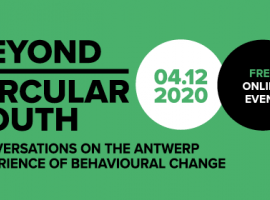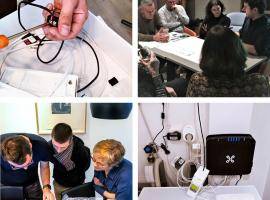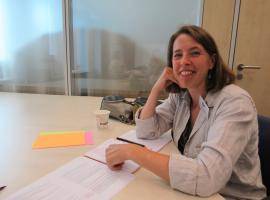Antwerp Circular South at the 11th meeting of the Urban Agenda Partnership on Circular Economy

Rooted in the daily lives and concrete actions of the City of Oslo, we first visited a “Mini Recycling centre” (“Minigjenbruksstasjon”), one of the 8 such small shops in the City, where citizens from the neighbourhood have the opportunity to give away some of their objects or material, either for recycling or for re-use. It is open daily, with an average 100-300 visitor a day, and is highly successful in ensuring that waste is correctly sorted or even re-used, together with some activities about waste prevention. This approach actually echoes the work of one of the actions of the Urban Agenda Partnership, led by Siri Karlsen Bellika from the City of Oslo, on mapping existing Urban Resource Centres as “local approaches to waste prevention, re-use, repair and recycling in a circular economy”, to be published and shared before the Summer 2019.
The UIA Antwerp Circular South contributed to this work and will get the chance to learn from this catalogue with the development of its Circular Community Centre (CIRCUIT), led by de Kringwinkel (Zoom-in soon to be published). As such, exchanges amongst cities but also other stakeholders (such as the EIB, Finish government Flanders Region) have been extremely fruitful and complementary for each other’s work and actions.
Our next visit led us to a recycling plant, which has also started organising a “giveway evening”, with an average of 200 visitors per evening, when visitors can come and help themselves with objects which are still usable but thrown away by local residents. Oslo has developed many other activities in relation to Circular economy which are highly inspiring for other cities and which make clear that it has not stolen its 2019 European Green Capital award: actions towards plastic and marine pollution, a Centre for urban ecology, a Climate policy, and circular consumption and food waste prevention, amongst others. The position of the City of Oslo is clear “Cities are taking over the responsibility for fighting for climate change all over the world. They should act at their own level but also push their national governments to act as well”, claimed Lan Marie Nguyen Berg, Vice Mayor for Environment and Transport at the City of Oslo.

The recycling plant ready for the giveway evening , photo by Marcelline Bonneau
Although not formally in the Partnership, the UIA Antwerp Circular South project has contributed to its learning and exchange via participation in physical and virtual meetings, while also benefiting from the Partnership’s inputs. As the UA partnerships are reaching towards their end, UIA is regarded as a potential source of funding for implementing some of the actions in given cities. The participants also stressed other programmes such as the URBACT programme to further strengthen exchange of practices and the REGIO Communities of Practitioners - with the use of the TAIEX-REGIO PEER 2 PEER tool - for the peer learning and exchange. These are complementary to UIA and further synergies could be reinforced between all of them.
A few words on the Urban Agenda partnership on Circular Economy
The Urban Agenda Partnership on Circular Economy is one of the 14 such partnerships launched with the Pact of Amsterdam since 2016, in order to collaboratively identify problems and solutions and implement concrete actions in a multi-level working method promoting cooperation between Member States, cities, the European Commission and other stakeholders.
The Urban Agenda for the EU Circular Economy partnership, is coordinated by the City of Oslo. It is composed of six urban authorities, namely the City of Oslo, The Hague, Prato, Porto, Kaunas and Flanders region; Member States: Finland, Poland, Slovenia and Greece; the European Commission (DG REGIO, DG ENV, DG CLIMA, DG RTD, and DG GROW); the Council of European Municipalities and Regions (CEMR); Eurocities; URBACT; the European Investment Bank (EIB); and stakeholders (the Association of Cities and Regions for Sustainable Resource management (ACR+); ICLEI, Europa Decentraal, RReuse, OuiShare, and the University of Nijmegen (NL)).
The 12 actions under work in the partnership are:
Better Regulation
1. Help make waste legislation support the circular economy in cities
2. Help make water legislation support the circular economy in cities
3. Analyse of the regulatory obstacles and drivers for boosting an urban circular bioeconomy
Better Funding
4. Prepare a Circular City Funding Guide to assist cities in accessing funding for circular economy projects
5. Mainstreaming the circular economy as an eligible area into the post 2020 Cohesion Policy and corresponding Funds
Better Knowledge
6. Prepare a blueprint for a Circular City Portal
7. Promote Urban Resource Centres for waste prevention, re-use and recycling
8. Develop a ‘Circular Resource Management’ Roadmap for cities
9. Develop a Collaborative Economy Knowledge Pack for cities
10. Manage the re-use of buildings and spaces in a circular economy
11. Develop City Indicators for Circular Economy
12. Develop a “Pay – as – you - throw” toolkit with coaching
























